Business Law Assignment: Contract Formation and Vicarious Liability
VerifiedAdded on 2023/01/18
|6
|1251
|82
Homework Assignment
AI Summary
This business law assignment addresses two key questions related to a construction project. The first question examines whether a contract was formed between PCUK and Speedo, analyzing the elements of offer, acceptance, and consideration. The analysis concludes that no contract was formed due to issues with acceptance and timing. The second question explores vicarious liability and negligence, specifically addressing the implications of a project manager ignoring safety warnings and the impact of a visitor's contributory negligence. The assignment applies legal principles to the scenario, discussing the responsibilities of subcontractors and the impact of a visitor's actions on liability claims. It references relevant case law to support its conclusions, providing a comprehensive legal analysis of the situation.
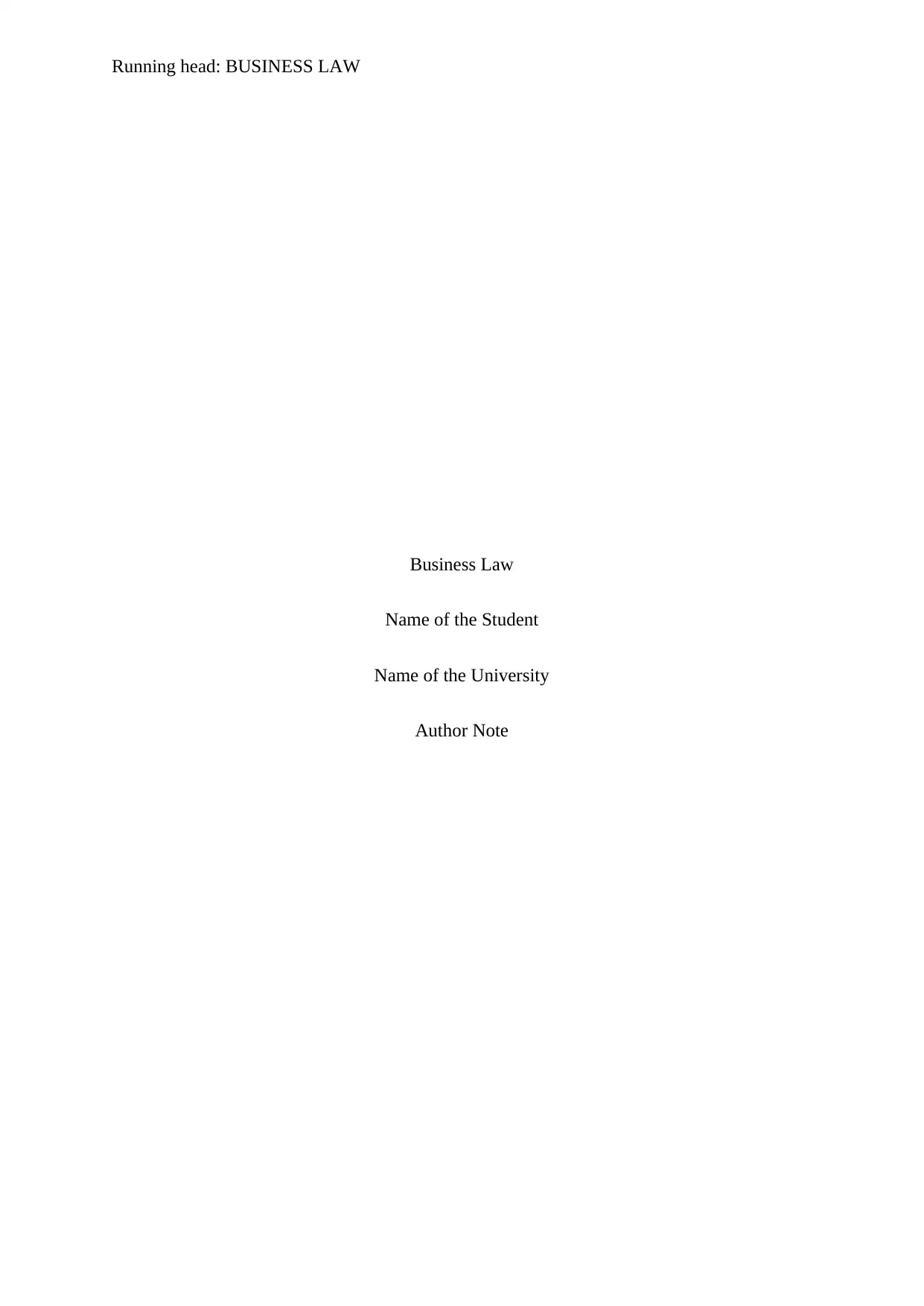
Running head: BUSINESS LAW
Business Law
Name of the Student
Name of the University
Author Note
Business Law
Name of the Student
Name of the University
Author Note
Paraphrase This Document
Need a fresh take? Get an instant paraphrase of this document with our AI Paraphraser
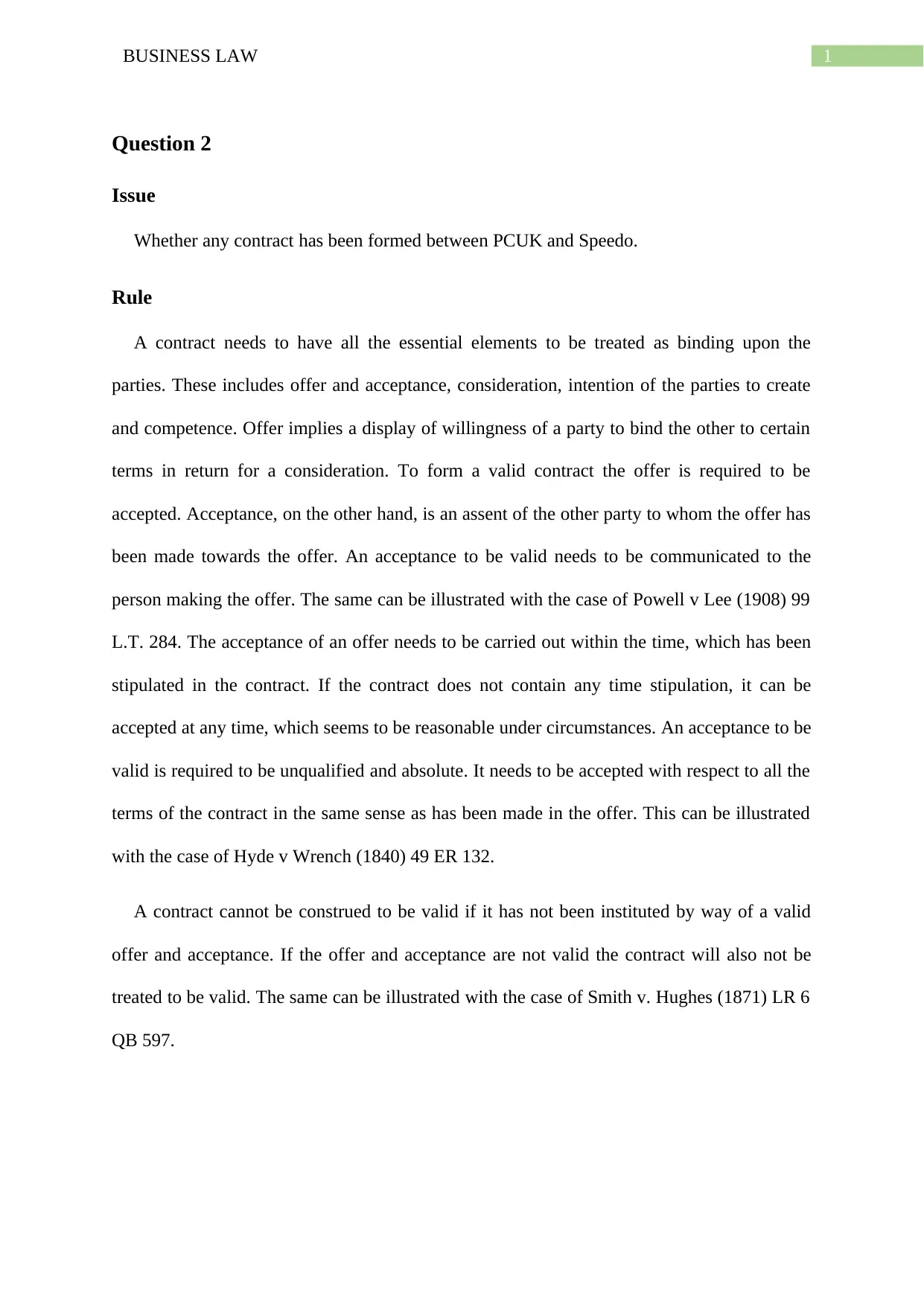
1BUSINESS LAW
Question 2
Issue
Whether any contract has been formed between PCUK and Speedo.
Rule
A contract needs to have all the essential elements to be treated as binding upon the
parties. These includes offer and acceptance, consideration, intention of the parties to create
and competence. Offer implies a display of willingness of a party to bind the other to certain
terms in return for a consideration. To form a valid contract the offer is required to be
accepted. Acceptance, on the other hand, is an assent of the other party to whom the offer has
been made towards the offer. An acceptance to be valid needs to be communicated to the
person making the offer. The same can be illustrated with the case of Powell v Lee (1908) 99
L.T. 284. The acceptance of an offer needs to be carried out within the time, which has been
stipulated in the contract. If the contract does not contain any time stipulation, it can be
accepted at any time, which seems to be reasonable under circumstances. An acceptance to be
valid is required to be unqualified and absolute. It needs to be accepted with respect to all the
terms of the contract in the same sense as has been made in the offer. This can be illustrated
with the case of Hyde v Wrench (1840) 49 ER 132.
A contract cannot be construed to be valid if it has not been instituted by way of a valid
offer and acceptance. If the offer and acceptance are not valid the contract will also not be
treated to be valid. The same can be illustrated with the case of Smith v. Hughes (1871) LR 6
QB 597.
Question 2
Issue
Whether any contract has been formed between PCUK and Speedo.
Rule
A contract needs to have all the essential elements to be treated as binding upon the
parties. These includes offer and acceptance, consideration, intention of the parties to create
and competence. Offer implies a display of willingness of a party to bind the other to certain
terms in return for a consideration. To form a valid contract the offer is required to be
accepted. Acceptance, on the other hand, is an assent of the other party to whom the offer has
been made towards the offer. An acceptance to be valid needs to be communicated to the
person making the offer. The same can be illustrated with the case of Powell v Lee (1908) 99
L.T. 284. The acceptance of an offer needs to be carried out within the time, which has been
stipulated in the contract. If the contract does not contain any time stipulation, it can be
accepted at any time, which seems to be reasonable under circumstances. An acceptance to be
valid is required to be unqualified and absolute. It needs to be accepted with respect to all the
terms of the contract in the same sense as has been made in the offer. This can be illustrated
with the case of Hyde v Wrench (1840) 49 ER 132.
A contract cannot be construed to be valid if it has not been instituted by way of a valid
offer and acceptance. If the offer and acceptance are not valid the contract will also not be
treated to be valid. The same can be illustrated with the case of Smith v. Hughes (1871) LR 6
QB 597.
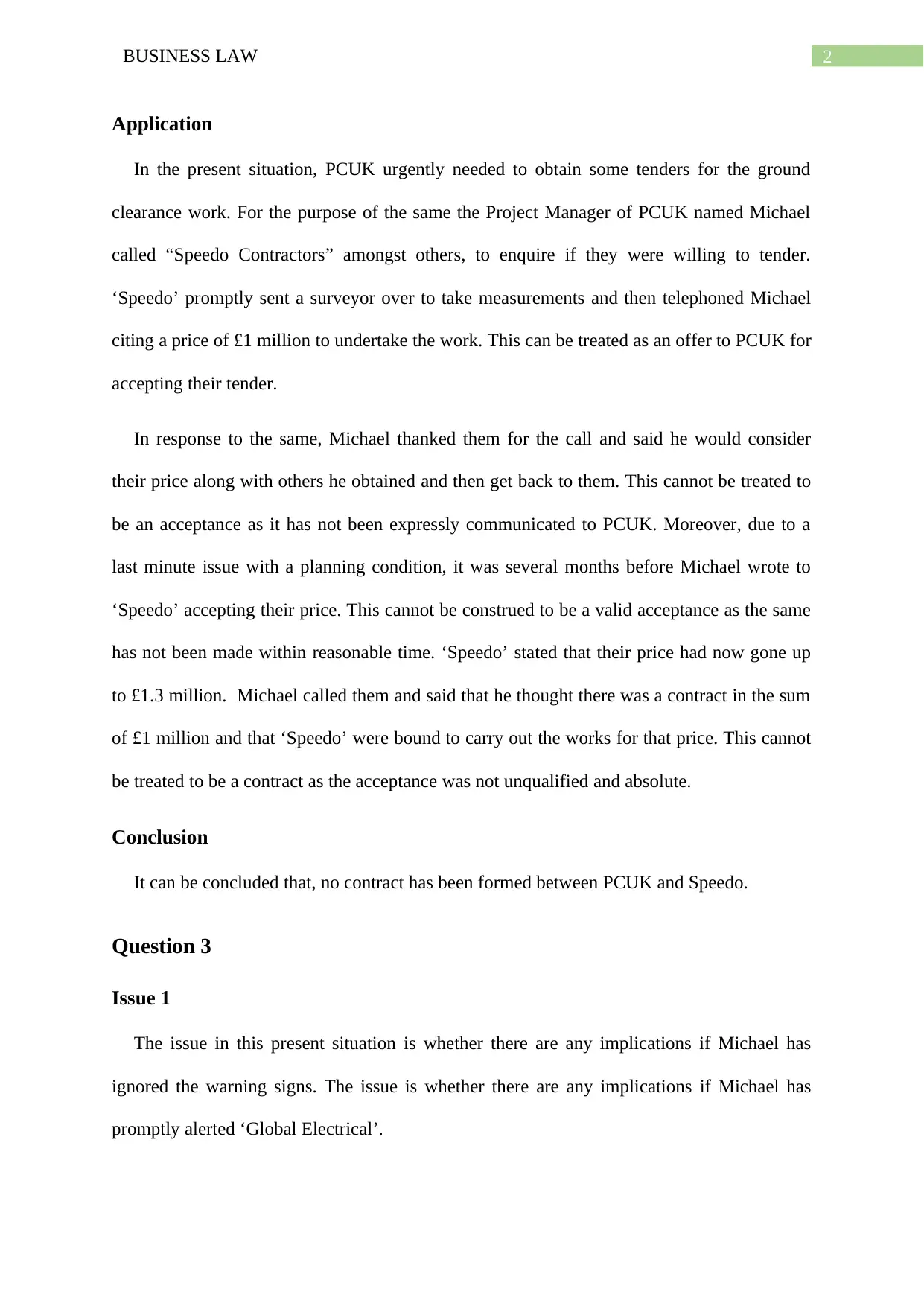
2BUSINESS LAW
Application
In the present situation, PCUK urgently needed to obtain some tenders for the ground
clearance work. For the purpose of the same the Project Manager of PCUK named Michael
called “Speedo Contractors” amongst others, to enquire if they were willing to tender.
‘Speedo’ promptly sent a surveyor over to take measurements and then telephoned Michael
citing a price of £1 million to undertake the work. This can be treated as an offer to PCUK for
accepting their tender.
In response to the same, Michael thanked them for the call and said he would consider
their price along with others he obtained and then get back to them. This cannot be treated to
be an acceptance as it has not been expressly communicated to PCUK. Moreover, due to a
last minute issue with a planning condition, it was several months before Michael wrote to
‘Speedo’ accepting their price. This cannot be construed to be a valid acceptance as the same
has not been made within reasonable time. ‘Speedo’ stated that their price had now gone up
to £1.3 million. Michael called them and said that he thought there was a contract in the sum
of £1 million and that ‘Speedo’ were bound to carry out the works for that price. This cannot
be treated to be a contract as the acceptance was not unqualified and absolute.
Conclusion
It can be concluded that, no contract has been formed between PCUK and Speedo.
Question 3
Issue 1
The issue in this present situation is whether there are any implications if Michael has
ignored the warning signs. The issue is whether there are any implications if Michael has
promptly alerted ‘Global Electrical’.
Application
In the present situation, PCUK urgently needed to obtain some tenders for the ground
clearance work. For the purpose of the same the Project Manager of PCUK named Michael
called “Speedo Contractors” amongst others, to enquire if they were willing to tender.
‘Speedo’ promptly sent a surveyor over to take measurements and then telephoned Michael
citing a price of £1 million to undertake the work. This can be treated as an offer to PCUK for
accepting their tender.
In response to the same, Michael thanked them for the call and said he would consider
their price along with others he obtained and then get back to them. This cannot be treated to
be an acceptance as it has not been expressly communicated to PCUK. Moreover, due to a
last minute issue with a planning condition, it was several months before Michael wrote to
‘Speedo’ accepting their price. This cannot be construed to be a valid acceptance as the same
has not been made within reasonable time. ‘Speedo’ stated that their price had now gone up
to £1.3 million. Michael called them and said that he thought there was a contract in the sum
of £1 million and that ‘Speedo’ were bound to carry out the works for that price. This cannot
be treated to be a contract as the acceptance was not unqualified and absolute.
Conclusion
It can be concluded that, no contract has been formed between PCUK and Speedo.
Question 3
Issue 1
The issue in this present situation is whether there are any implications if Michael has
ignored the warning signs. The issue is whether there are any implications if Michael has
promptly alerted ‘Global Electrical’.
⊘ This is a preview!⊘
Do you want full access?
Subscribe today to unlock all pages.

Trusted by 1+ million students worldwide
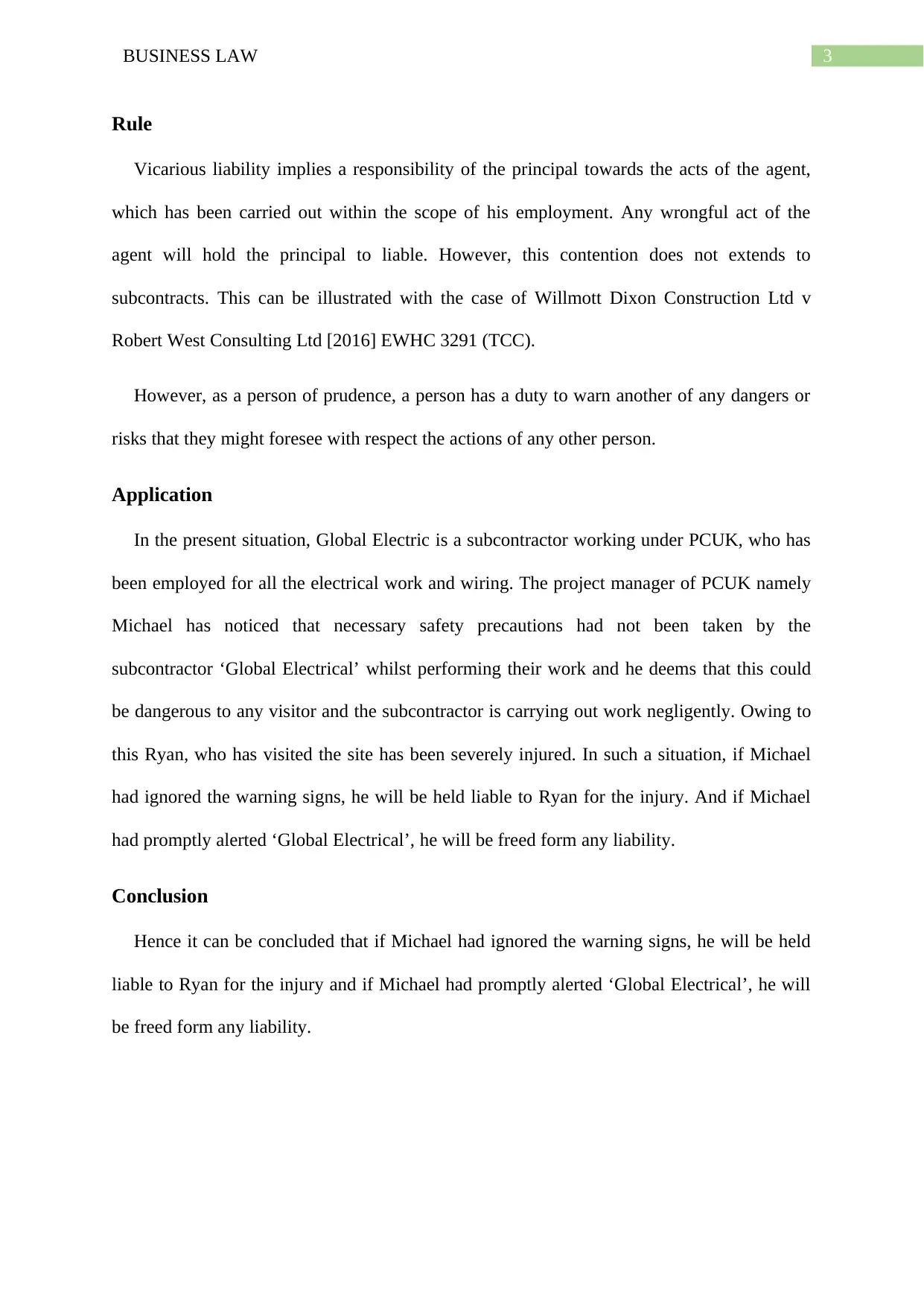
3BUSINESS LAW
Rule
Vicarious liability implies a responsibility of the principal towards the acts of the agent,
which has been carried out within the scope of his employment. Any wrongful act of the
agent will hold the principal to liable. However, this contention does not extends to
subcontracts. This can be illustrated with the case of Willmott Dixon Construction Ltd v
Robert West Consulting Ltd [2016] EWHC 3291 (TCC).
However, as a person of prudence, a person has a duty to warn another of any dangers or
risks that they might foresee with respect the actions of any other person.
Application
In the present situation, Global Electric is a subcontractor working under PCUK, who has
been employed for all the electrical work and wiring. The project manager of PCUK namely
Michael has noticed that necessary safety precautions had not been taken by the
subcontractor ‘Global Electrical’ whilst performing their work and he deems that this could
be dangerous to any visitor and the subcontractor is carrying out work negligently. Owing to
this Ryan, who has visited the site has been severely injured. In such a situation, if Michael
had ignored the warning signs, he will be held liable to Ryan for the injury. And if Michael
had promptly alerted ‘Global Electrical’, he will be freed form any liability.
Conclusion
Hence it can be concluded that if Michael had ignored the warning signs, he will be held
liable to Ryan for the injury and if Michael had promptly alerted ‘Global Electrical’, he will
be freed form any liability.
Rule
Vicarious liability implies a responsibility of the principal towards the acts of the agent,
which has been carried out within the scope of his employment. Any wrongful act of the
agent will hold the principal to liable. However, this contention does not extends to
subcontracts. This can be illustrated with the case of Willmott Dixon Construction Ltd v
Robert West Consulting Ltd [2016] EWHC 3291 (TCC).
However, as a person of prudence, a person has a duty to warn another of any dangers or
risks that they might foresee with respect the actions of any other person.
Application
In the present situation, Global Electric is a subcontractor working under PCUK, who has
been employed for all the electrical work and wiring. The project manager of PCUK namely
Michael has noticed that necessary safety precautions had not been taken by the
subcontractor ‘Global Electrical’ whilst performing their work and he deems that this could
be dangerous to any visitor and the subcontractor is carrying out work negligently. Owing to
this Ryan, who has visited the site has been severely injured. In such a situation, if Michael
had ignored the warning signs, he will be held liable to Ryan for the injury. And if Michael
had promptly alerted ‘Global Electrical’, he will be freed form any liability.
Conclusion
Hence it can be concluded that if Michael had ignored the warning signs, he will be held
liable to Ryan for the injury and if Michael had promptly alerted ‘Global Electrical’, he will
be freed form any liability.
Paraphrase This Document
Need a fresh take? Get an instant paraphrase of this document with our AI Paraphraser
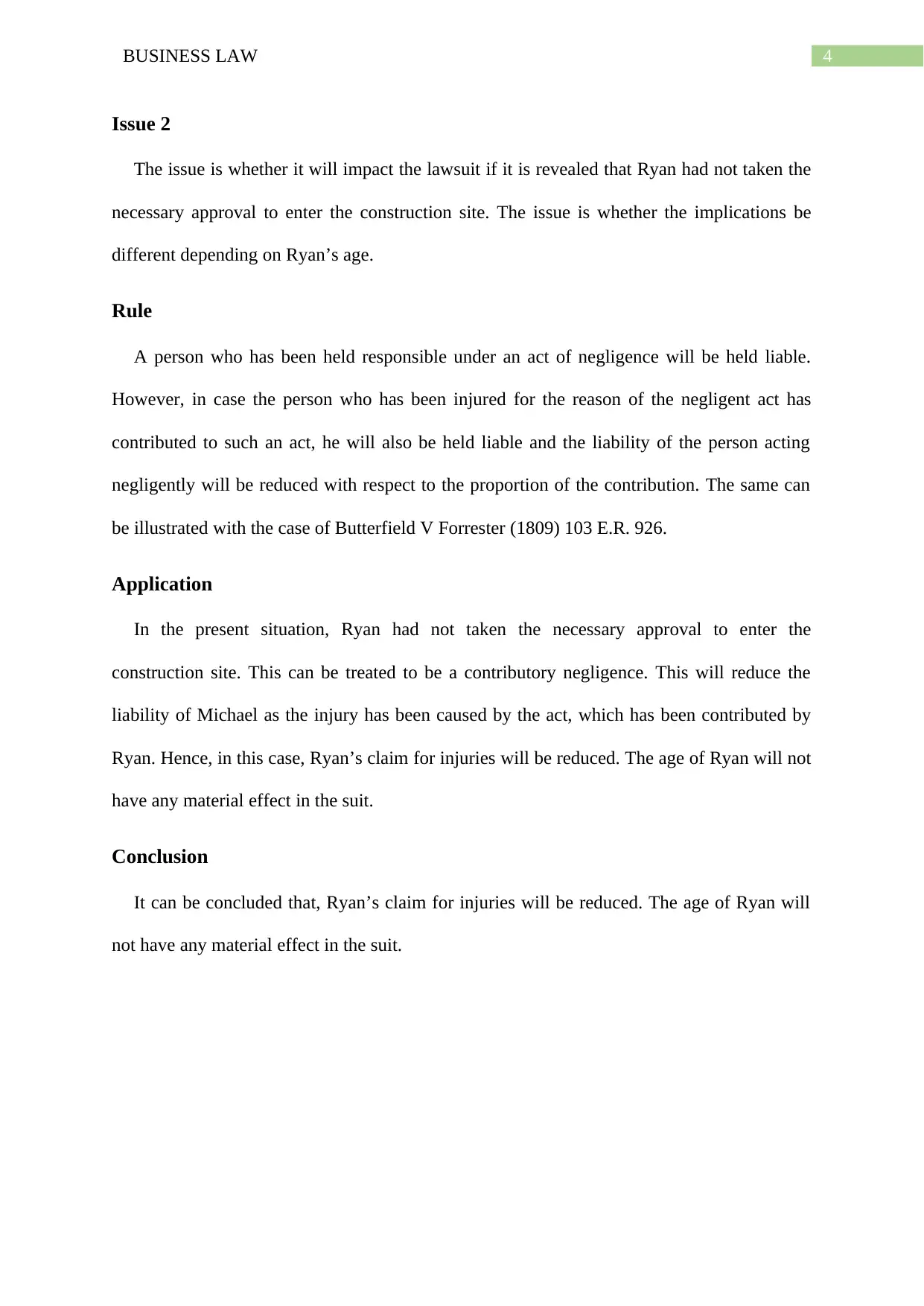
4BUSINESS LAW
Issue 2
The issue is whether it will impact the lawsuit if it is revealed that Ryan had not taken the
necessary approval to enter the construction site. The issue is whether the implications be
different depending on Ryan’s age.
Rule
A person who has been held responsible under an act of negligence will be held liable.
However, in case the person who has been injured for the reason of the negligent act has
contributed to such an act, he will also be held liable and the liability of the person acting
negligently will be reduced with respect to the proportion of the contribution. The same can
be illustrated with the case of Butterfield V Forrester (1809) 103 E.R. 926.
Application
In the present situation, Ryan had not taken the necessary approval to enter the
construction site. This can be treated to be a contributory negligence. This will reduce the
liability of Michael as the injury has been caused by the act, which has been contributed by
Ryan. Hence, in this case, Ryan’s claim for injuries will be reduced. The age of Ryan will not
have any material effect in the suit.
Conclusion
It can be concluded that, Ryan’s claim for injuries will be reduced. The age of Ryan will
not have any material effect in the suit.
Issue 2
The issue is whether it will impact the lawsuit if it is revealed that Ryan had not taken the
necessary approval to enter the construction site. The issue is whether the implications be
different depending on Ryan’s age.
Rule
A person who has been held responsible under an act of negligence will be held liable.
However, in case the person who has been injured for the reason of the negligent act has
contributed to such an act, he will also be held liable and the liability of the person acting
negligently will be reduced with respect to the proportion of the contribution. The same can
be illustrated with the case of Butterfield V Forrester (1809) 103 E.R. 926.
Application
In the present situation, Ryan had not taken the necessary approval to enter the
construction site. This can be treated to be a contributory negligence. This will reduce the
liability of Michael as the injury has been caused by the act, which has been contributed by
Ryan. Hence, in this case, Ryan’s claim for injuries will be reduced. The age of Ryan will not
have any material effect in the suit.
Conclusion
It can be concluded that, Ryan’s claim for injuries will be reduced. The age of Ryan will
not have any material effect in the suit.
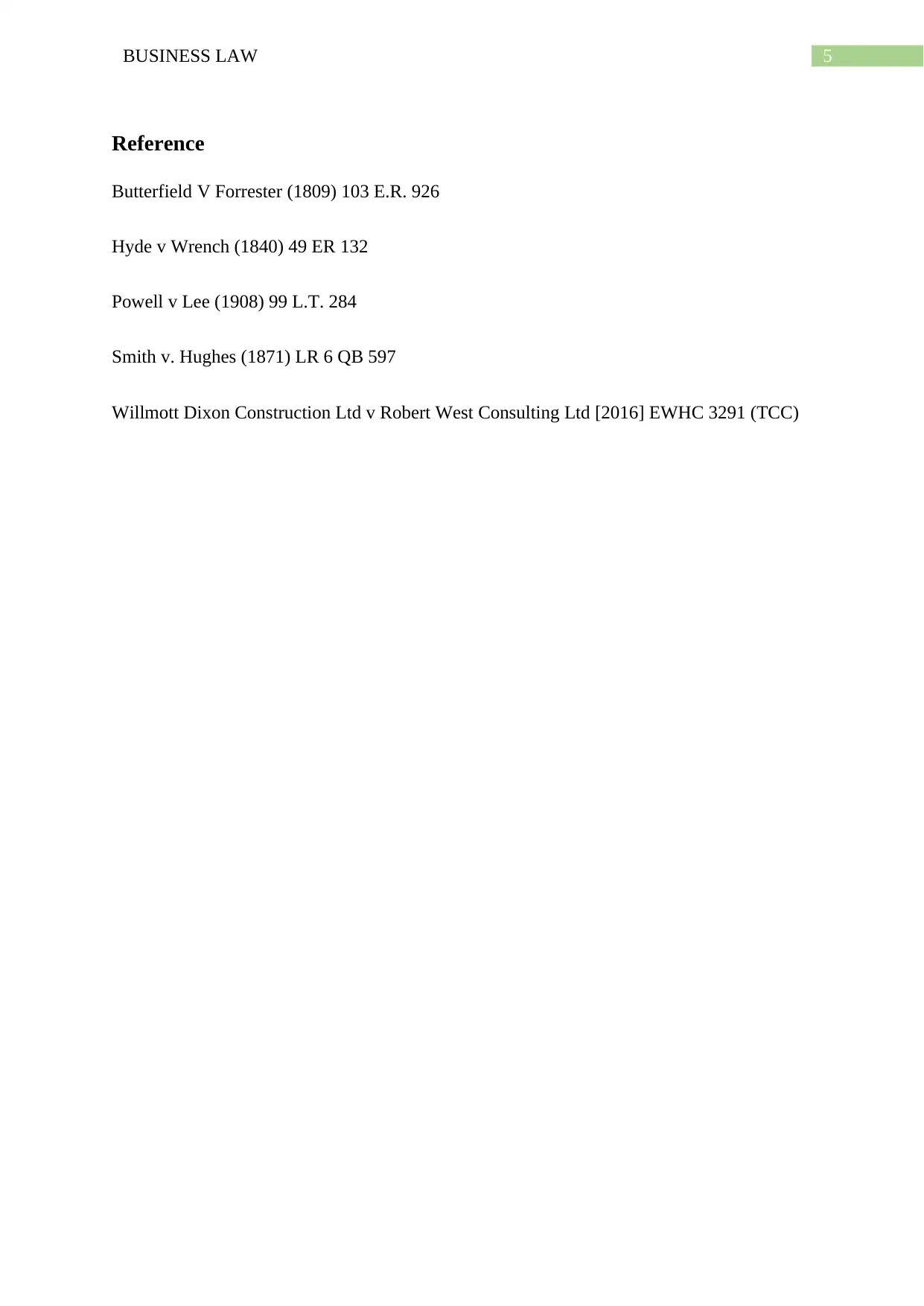
5BUSINESS LAW
Reference
Butterfield V Forrester (1809) 103 E.R. 926
Hyde v Wrench (1840) 49 ER 132
Powell v Lee (1908) 99 L.T. 284
Smith v. Hughes (1871) LR 6 QB 597
Willmott Dixon Construction Ltd v Robert West Consulting Ltd [2016] EWHC 3291 (TCC)
Reference
Butterfield V Forrester (1809) 103 E.R. 926
Hyde v Wrench (1840) 49 ER 132
Powell v Lee (1908) 99 L.T. 284
Smith v. Hughes (1871) LR 6 QB 597
Willmott Dixon Construction Ltd v Robert West Consulting Ltd [2016] EWHC 3291 (TCC)
⊘ This is a preview!⊘
Do you want full access?
Subscribe today to unlock all pages.

Trusted by 1+ million students worldwide
1 out of 6
Related Documents
Your All-in-One AI-Powered Toolkit for Academic Success.
+13062052269
info@desklib.com
Available 24*7 on WhatsApp / Email
![[object Object]](/_next/static/media/star-bottom.7253800d.svg)
Unlock your academic potential
Copyright © 2020–2026 A2Z Services. All Rights Reserved. Developed and managed by ZUCOL.





